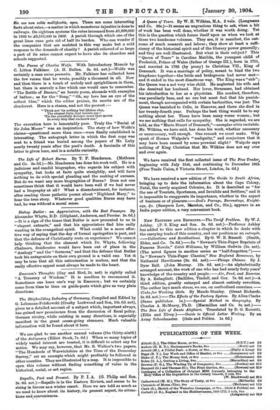A Queen of Tears. By W. H. Wilkins, M.A., 2
vols. (Longmans and Co. 36s.)--It seems an ungracious thing to ask, when a bit of work has been well done, whether it was worth doing. Yet this is the question which forces itself upon us when we look at these two handsome volumes. They are, it is manifest, the out- come of much research and labour; they show at least a suffi- ciency of the historical spirit and of the literary power generally; and they are well illustrated. But what is their subject? This "Queen of Tears" is Caroline Matilda, the youngest child of
Frederick, Prince of Wales (father of George born in 1751, and married in 1766 (by proxy) to Christian VII., King of Denmark. It was a marriage of policy, meant to bind the two kingdems together-the bride and bridegroom had never met- and it ended in the most disastrous way. The King was a " cub" ; the Queen was a not very wise child. He neglected his wife and she deceived her husband. Her lover, Struensee, had obtained his introduction to her as a physician. His conduct, therefore, was peculiarly base, and no one but must feel that his punish- ment, though accompanied with certain barbarities, was just. The Queen was banished to Celle, in Hanover, and there she died in her twenty-fourth year. Perhaps the best thing would be to say nothing about her. There have been many worse women ; but we see nothing that calls for sympathy. She is regarded, we are told, as the "Marie Stuart of Denmark,"-exemplar vitiis imitabile. Mr. Wilkins, we have said, has done his work, whether necessary or unnecessary, well enough. One remark we must make. Why speak of Horace Walpole's "malignity," and conjecture that it may have been caused by some personal slight? Walpole says nothing of King Christian that Mr. Wilkins does not say over and over again.






















































 Previous page
Previous page